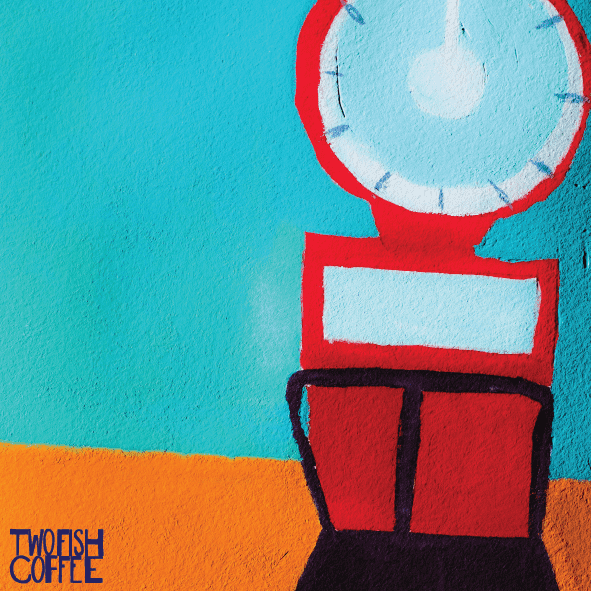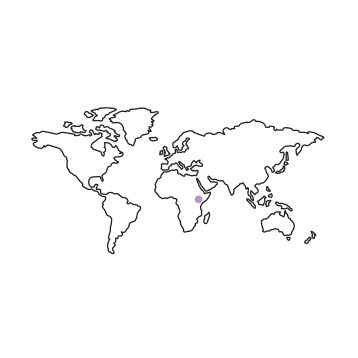Juicy and bright. Raspberries, black currants and citrus with brown sugar sweetness. Balanced and clean.
About Kabumbu AA (with thanks to Melbourne Coffee Merchants)
Kabumbu is a small coffee estate in Kirinyaga County, owned and managed by Joseph Mugo Karaba (pictured above). Joseph inherited the shamba (Swahili for ‘farm’) from his father, who first planted coffee in the 1960s. He and his family live on the estate which includes five acres of coffee trees and a small wet mill, where Joseph processes and prepares his coffees.
Kabumbu sits across 1,500-1,750 meters above sea level in the foothills of the extinct volcano, Mt Kenya. The area is defined by its bright red, nutrient-rich, volcanic soil and cool climate, both of which contribute to the outstanding quality of the coffees produced on this farm. Joseph grows SL-28 and SL-34 varieties on his farm, which were planted by his father when the shamba was established. The trees have been continuously regenerated since that time, using a stumping technique where new stalks are allowed to grow from the stump to replace older stalks, which are then cut back when the new stalks reach full maturation. In addition to these varieties, Joseph has chosen to plant a newer hybrid variety, Batian, which has been developed specifically for high yields and disease resistance, coupled with the potential for excellent cup quality.
Alongside the coffee shamba, Kabumbu Estate also has a small wet mill – or factory, as they are called in Kenya – on its land. This factory enables Joseph to process and dry his coffee crop onsite, rather than selling fresh, whole cherry to a local Farmers’ Society Cooperative. By processing his coffee independently, Joseph is able to control every step of the coffee’s production directly – from farming, to harvesting, processing, drying and sale – which helps him to ensure the full potential of his crop is achieved in terms of quality and price. The resulting coffee reflects the incredible amount of hard work and attention to managing every single variable that influences quality.
Choosing to process the coffee independently is not easy—or cheap. Managing processing on such a small scale has required significant investment in infrastructure, equipment and staff. It is also far costlier to process small volume lots than large day lots. This investment has paid off, however, as Kabumbu is now producing some exceptionally high-quality lots which fetch very high prices at the point of sale.
HOW THIS COFFEE WAS PROCESSED
The coffee was carefully handpicked by Joseph and his team and sorted to ensure only the ripe cherries were processed. It was pulped using a disc pulping machine, which removes the skin and fruit from the inner parchment layer that protects the green coffee bean.
The coffee was then dry fermented for 16–24 hours, to break down the sugars and remove the mucilage (sticky fruit covering) from the outside of the beans. Whilst the coffee was fermenting it was checked and when ready it was rinsed and removed from the tanks.
The parchment covered coffee was then washed in water channels with fresh water and sent to soaking tanks where it sat underwater for a further 24 hours. This process increases the proteins and amino acids, which in turn heightens the complexity of the acidity.
After soaking, the coffee was dried on raised drying tables (also known as African beds) and turned constantly to ensure they are dried evenly until they were at 11–12% humidity.
The coffee was then rested in parchment, and when ready for export, dry milled at Kahara Bowa mill in Thika, around a one hour drive from Nairobi.
GRADING
Kenya uses a grading system for all its exportable coffee lots. The grading system is based on the size and assumed quality of the bean. A coffee’s grade is directly correlated with the price it attracts at auction or through direct trade.
This coffee is AA grade. This grade is easily defined by size (in this case, AA means that the beans are screen size 18 and above) and to a certain extent, quality. While it is assumed that AA lots represent the highest quality, we have often found AB and peaberry lots to be just as good.
To cement our relationship with Joseph we purchased his entire exportable production this year, which ensures that he receives a good price for all grades of his coffee.
KABUMBU and SUCASTAINABILITY
Since 2017, Kabumbu has received support from Sucastainability—a marketing agent that is on the ground directly helping Joseph with training, education and support, and to secure the very best prices for his milled coffee. Joseph was one of the first farmer clients to work with Sucastainability, and has a close relationship with their team!
Unlike other agents in Kenya, Sucastainability has a particular focus on working with small-holder farms like Ngamba that have the infrastructure to process coffee on their own estates, but whose lot volumes are too small to sell at auction. Though this can be challenging (the smaller lot sizes are more expensive to mill and market), it is worthwhile because it provides more traceability and transparency and ensures that premiums paid for the coffee are given directly back to the producer.
Sucastainability currently works with over 1000 small-holder farmers and 70 cooperatives across all coffee-producing regions of Kenya. The agency is managed by Wycliffe Odhiambo Murwayi who has over twenty years of experience working in the Kenyan coffee industry. His team of agronomists is headed up by Lucy Wanjiku Njoroge and they have a representative in each of the six coffee growing regions in Kenya. The team takes into consideration the individual needs of the producers they are working with and provides tailored advice and resources to help improve yields and quality. They also arrange financial assistance, by providing micro-financing ahead of harvest, and by buying inputs (like essential fertilisers and pesticides) in bulk and selling them at a discount to the producers.
Sucastainability is responsible for milling the coffee and also provides an important sensory analysis of the coffees. They are also responsible for marketing and on-selling the coffee either directly to traders or via the Auction system, who then sell the coffee to the final buyer. To learn more about the chain of custody in Kenya, click here.
ABOUT KIRINYAGA
Kirinyaga County is part of Kenya’s former Central Province, which was dissolved in 2013. The area includes Murang’a, Nyeri, Kirinyaga, Kiambu and Nyandarua Counties, and is traditionally the homeland of people of Kikiyu ethnicity. The central highlands of Kenya are considered to be one of the wealthiest areas of the country, due to the incredibly fertile land, geographical proximity to the capital, Nairobi, and close integration with the country’s colonial administration before Kenya gained independence in 1962. This integration afforded the communities of Central Kenya with opportunities for education, business and political prowess, despite the various injustices of the colonial government. The Kikiyu people have a long and proud history of agriculture and the region is farmed intensively, with coffee, tea and dairy being the most important modern crops.
Like Joseph, many of the producers in the region are second-generation landholders, whose parents would have purchased and planted the land in the 1950s and 1960s, after agricultural reform allowed for small Kenyan farmers to produce cash crops on their family farms (instead of only on large, British owned estates). Farmers in Kirinyaga grow coffee as a cash crop alongside food crops like banana, maize, macadamia, avocados and vegetables. Tea and dairy are also important sources of income for the producers.
WHAT’S IN A NAME
Kabumbu (pronounced “kah-boom-buh”) means “small hill” in Swahili.

